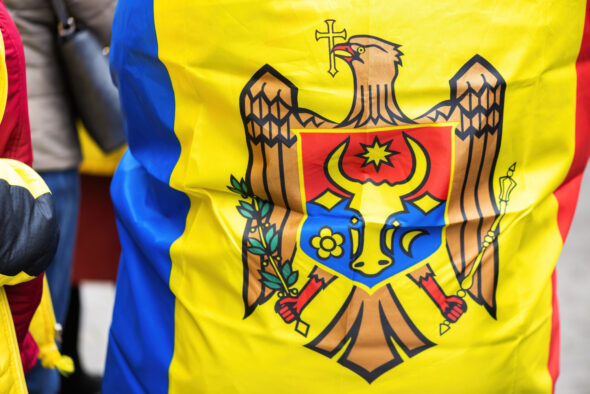The homeopathic gas supply organized by Poles and Ukrainians to Moldova, which is suffering from shortages, is only a band-aid solution. Putin used Gazprom as a weapon against that country. It’s time for Europe to respond – writes Wojciech Jakóbik, editor-in-chief at BiznesAlert.pl.
Polish-Ukrainian-American relief
On the 26th of October, for the first time in history, Moldova will import non-Russian gas. The country will receive one million cubic meters at the border with Ukraine as it won a tender organized by Poland’s PGNiG supported by the American-Ukrainian ERU, which acts as an intermediary in the sale of gas on the Dnieper. Although the data on this commercial contract are secret, the emergency gas supply will cost, according to the estimates of the Kommersant daily, about USD 1,100 per 1,000 cubic meters. This Russian newspaper is always ready to serve excuses for Gazprom, which is responsible for gas shortages in Moldova. Now it argues that Gazprom wanted to sell Moldova even five million cubic meters of gas at a price of USD 800 per 1000 cubic meters on the basis of the old gas contract, but the Moldovans did not want to extend the agreement. The Kommersant also brought up the claim of the Russian company about the USD 709 million debt of Moldovagaz. Coincidentally the paper decided to call attention to this issue exactly at the time when Chisinau is facing gas shortages. It is worth recalling that the estimated price of gas in the contract between Gazprom and Moldovagaz, which ended in 2020, was at about USD 175 per 1,000 cubic meters. It is worth stressing that the PGNiG-ERU duet is becoming part of a bigger plot to make the region independent of gas from Russia, similar to the LNG deal between Poland, Ukraine and the US. The diplomatic forces from Warsaw, Kiev and Washington are acting behind the scenes as part of a political agreement on gas cooperation in the region.
Gazprom’s recidivism, or gas as a weapon in practice
Gazprom’s actions are recidivism. Russians usually bring up the debts of companies that import gas from them during political turning points or a difficult economic situation. This was the case with the debts of Naftogaz on the eve of the planned signing of the EU-Ukraine association agreement by President Viktor Yanukovych. When Yanukovych was about to sign the agreement, the debts of Naftogaz have become a problem. When under pressure from the Kremlin and in exchange for a gas discount he did not sign the document, the debts were forgotten. When he was overthrown and replaced by Petro Poroshenko, the debts of Naftogaz again became the subject of dispute. It was no different when Belarus negotiated a new gas contract with Gazprom and wanted a discount. Debts immediately became a bargaining chip. After the negotiations ended the way Russians wanted, the debts ceased to be a problem. This is because the Russians are actually ready to subsidise the price of gas to countries that pursue policies that are in line with the Kremlin’s expectations, the best example of which are Armenia and Belarus. When a country pursues a policy contrary to the interests of the Kremlin, gas supplies become the subject of a dispute, which serves the political purposes of Vladimir Putin.
This is how Russia’s gas threats should be understood. Moldova could have received Russian gas, but only after signing a new long-term contract. Meanwhile, the pro-Western government in Chisinau decided to abandon supplies from Russia in favor of supplies from the European Union with the help of Romania. This plan was not completed, because the connection between Romania and Moldova was delayed, which I wrote about in another text. Romania has not started the extraction necessary to commence deliveries to its northern neighbour, and the Moldovan gas network is under indirect control of Gazprom, which owns half of Moldovagaz’s shares. This is a historical burden, similar to the one pertaining to the Yamal gas pipeline in Poland.
Gas destabilization is political destabilization
Until recently Moldova has been importing 98 percent of its gas from Russia (a total of 3 billion cubic meters a year). The connection with Romania would yield 1.5 billion cubic meters a year that would not come from Gazprom, so the rest could come from the spot market. It should be stressed that the launch of the Nord Stream 2 gas pipeline would allow the Russians to further reduce the level of gas supplies through Moldova, as they did with Ukraine, in order to destabilize the gas sector there, and therefore also the political situation. It is worth reminding that Moldova has used up the technical gas that maintains the pressure in pipelines to cover the shortages. This raw material is used in the country’s CHP plants to generate power and heat. The energy crisis could cause social unrest that could lead to the overthrow of the pro-Western government in Chişinău. Russia is using gas as a weapon, and even though Gazprom is trying to present the current dispute as a purely commercial problem, it clearly has political undertones.
What will Europe do?
The European Commission is obliged to respond to the situation in Moldova, a member state of the Energy Community. It is an organisation that brings together countries outside the European Union that are integrating with the bloc’s gas and electricity sector through the harmonisation of regulations, the introduction of appropriate standards, and the development of transmission infrastructure.
– In theory, the Commission could engage in negotiations with Gazprom in a similar way as the trilateral EU-Ukraine-Russia process dating back to the years preceding the current interim agreement with Naftogaz, which runs until 2024.
– The EC could support the process of unclogging the Romania-Moldova gas pipeline and the reform of the ownership of Moldovagaz, which could follow the solutions successfully applied in Ukraine.
– The Commission could investigate Gazprom’s abuses in the Central and Eastern European market, which includes the Moldovan gas sector. Gazprom may have abused its influence on the gas transmission infrastructure in Moldova, which means Poland’s demands that another antitrust investigation against the Russian tycoon be conducted are justified.









